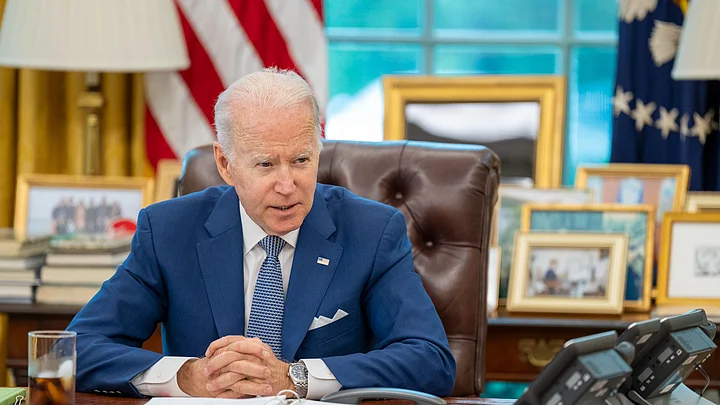Taiwan is in the spotlight again. This time, it is due to the United States President Joe Biden’s response to a media query on Washington’s commitment towards Taiwan during his press conference with Japanese Prime Minister Fumio Kishida in Tokyo. He said, “The United States will use force to defend Taiwan. That’s the commitment we made. We agree with the one-China policy. We’ve signed on to it and all the intended agreements were made from there. But the idea that it [Taiwan] can be taken by force, is just not, is just not appropriate.”
Expectedly, China responded by warning the United States against supporting Taiwan's independence. Wang Wenbin, a Chinese Ministry spokesperson, said, “On issues that bear on China’s sovereignty, territorial integrity and other core interests, no one shall expect China to make any compromise or trade-offs.”
However, this was not the first time Biden said that the United States will defend Taiwan if China tries to take Taiwan by force and change the status quo ante unilaterally. As a matter of fact, before his Tokyo comments, Biden has reiterated this twice in the past nine months. All three times, the State Department retracted Biden’s comments by clarifying that the US policy on Taiwan has not yet changed.
Joe Biden recently said that the US will use force to defend Taiwan in case China attacks Taiwan. Though the US government retracted the comment, such statements should be seen in a wider context of the US' Taiwan policy.
Following strategic ambiguity serves a dual purpose for the US, and, in a way, is beneficial to Taiwan as well.
In the near future, there will be continuity in the US’s Taiwan policy but, of course, with greater engagement with Taiwan.
The onus is on Washington to responsibly handle the issue – not just for the sake of Taiwan but also for peace and stability in the Indo-Pacific region.
How US Interprets One-China Policy
So, what do these comments imply? Do they mean that the United States is abandoning its long-practised strategic ambiguity? Or was it a gaffe? It does not seem so. Such statements should be seen in a wider context of the United States’ Taiwan policy and changing geopolitical situation. First, the United States’ interpretation and acknowledgement of the One-China Policy is different from that of China. The US acknowledges One-China Policy, and, in principle, it does not recognise Taiwan as part of China. Second, amid the ongoing Russia-Ukraine war and China’s growing aggression, it is only natural that due attention is given to the issue of Taiwan security.
Taiwan’s most robust partner is the US, which maintains unofficial ties with Taiwan within the frameworks of the US-China Three Communiqués, the 1979 Taiwan Relations Act and the 1982 Six Assurances. The US is also the biggest source of Taiwan’s arms imports. Despite such robust ties, till now, the US has not clarified whether it will support Taiwan militarily if China invades Taiwan. The policy of strategic ambiguity has been in place for decades, and the US’s broader Taiwan policy will continue to remain unchanged.
Strategic Ambiguity Serves a Dual Purpose
Following strategic ambiguity serves a dual purpose for the US, and, in a way, is beneficial to Taiwan as well. First, as long as the US does not officially commit to sending troops to Taiwan if China invades it, such comments do not really raise the stakes in cross-strait relations. But, at the same time, it does send an important message to China that changing the status quo with Taiwan will have repercussions. Second, such comments seem to be well-thought-out statements. Biden’s comments should be seen as ‘intent’ rather than an official pronouncement of US policy. Even though there is no official change in the US’s policy, such developments could still be seen as a reassurance of its commitment to Taiwan.
While Biden’s latest statement does not reflect a change in his Taiwan policy, the timing is noteworthy. That was President Biden’s first-ever visit to Asia, and the comments were made a day before the second Quad in-person summit. Such developments lead to the inclusion of the Taiwan question in mainstream discussions.
The US’s interest lies in deterring China from invading Taiwan, more so after Russia’s invasion of Ukraine. But do these statements really serve the purpose of creating deterrence? To some extent, they do. While China is attempting to shrink Taiwan’s international space and harass it by sending the fighter jets to its Air Defence Identification Zone (ADIZ) regularly, countries’ overt as well as tacit support to Taiwan plays an important role in deterring China.
US Official Policy Will Continue, But With More Engagement
A cross-strait conflict in the near future seems unlikely, but peace and stability are common interests for like-minded countries in the Indo-Pacific. Major stakeholders should seriously think of the likely impact of China’s rising aggression towards Taiwan on the Indo-Pacific.
The US’s abandonment of the policy of strategic ambiguity is still a far-fetched issue. In the near future, there will be continuity in the US’s Taiwan policy but, of course, with greater engagement with Taiwan. Given the unique nature of US-Taiwan relations, the onus is on Washington to responsibly handle the issue – not just for the sake of Taiwan but also for peace and stability in the Indo-Pacific region.
(Sana Hashmi is Visiting Fellow at the Taiwan-Asia Exchange Foundation. She tweets @sanahashmi1. This is an opinion article and the views expressed are the author's own. The Quint neither endorses nor is responsible for them.)
